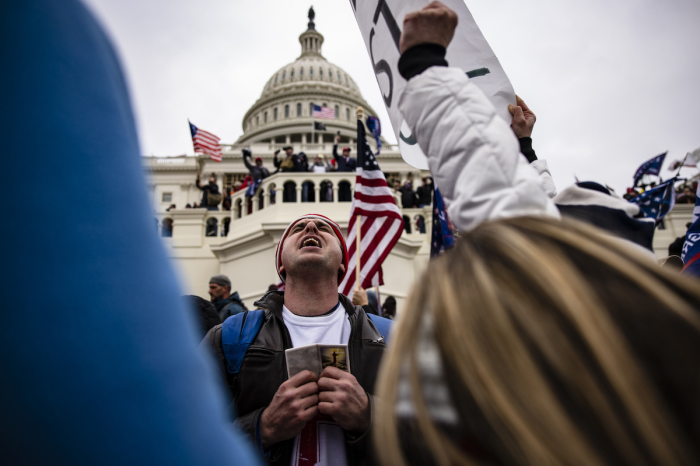Supreme Court sides with Jan. 6 rioter charged with obstruction

The U.S. Supreme Court has ruled in favor of an individual charged with obstruction during the Jan. 6, 2021, U.S. Capitol riot, which could impact some of the charges that former president Donald Trump is battling in court.
The high court ruled 6-3 on Friday that the obstruction charge that former Boston, Massachusetts, police officer Joseph Fischer was facing for his participation in the riot must be given a limited definition, reversing a lower court ruling and remanding the case for further proceedings.
Chief Justice John Roberts wrote the majority opinion, joined by Justices Clarence Thomas, Samuel Alito, Neil Gorsuch, Brett Kavanaugh and Ketanji Brown Jackson.
At issue was U.S. Code § 1512, which defines obstruction as when someone "alters, destroys, mutilates, or conceals a record, document, or other object, or attempts to do so, with the intent to impair the object's integrity or availability for use in an official proceeding" and then adds "otherwise obstructs, influences, or impedes any official proceeding, or attempts to do so."
According to Roberts, the "otherwise" in the second part of the section is "limited" in its definition by the items listed in the first part of the section.
"Construing Section 1512 in such a way gets the 'familiar' analysis we apply to these types of statutes' exactly backwards,' eliminating specific terms because of broad language that follows them, rather than limiting the broad language in light of narrower terms that precede it," wrote Roberts.
"The better conclusion is that subsection (c)(2) was designed by Congress to capture other forms of evidence and other means of impairing its integrity or availability beyond those Congress specified in (c)(1)."
Justice Amy Coney Barrett, a Trump appointee, authored a dissenting opinion, joined by Justices Sonia Sotomayor and Elena Kagan, arguing that whether Fischer committed obstruction should be "open and shut."
"Section 1512(c)(2) is a very broad provision, and admittedly, events like January 6th were not its target," wrote Barrett. "But statutes often go further than the problem that inspired them, and under the rules of statutory interpretation, we stick to the text anyway."
"Fischer allegedly participated in a riot at the Capitol that forced the delay of Congress's joint session on January 6th. Blocking an official proceeding from moving forward surely qualifies as obstructing or impeding the proceeding by means other than document destruction. Fischer's alleged conduct thus falls within (c)(2) 's scope."
U.S. Attorney General Merrick B. Garland expressed disappointment with the decision but said most of those facing prosecution over their alleged actions on Jan. 6 will not be impacted by it.
"I am disappointed by today's decision, which limits an important federal statute that the Department has sought to use to ensure that those most responsible for that attack face appropriate consequences," Garland said in a statement.
"For the cases affected by today's decision, the Department will take appropriate steps to comply with the Court's ruling. We will continue to use all available tools to hold accountable those criminally responsible for the January 6 attack on our democracy."
In March 2023, Fischer was arrested and charged with seven counts over his alleged actions during the Capitol riot, including obstruction of an official proceeding and assaulting an officer.
Fischer and other defendants have called for the obstruction charge to be dismissed, arguing that it does not apply to alleged Jan. 6 riot participants. Although a federal judge agreed with Fischer in 2022, a three-judge panel of the U.S. Circuit Court of Appeals for the District of Columbia reversed the ruling in April 2023.
The Supreme Court's decision could influence the legal proceedings against Trump, who is facing an obstruction charge via an indictment from a Washington, D.C. grand jury last year. More than 350 Jan. 6 defendants have been charged with obstruction.





























